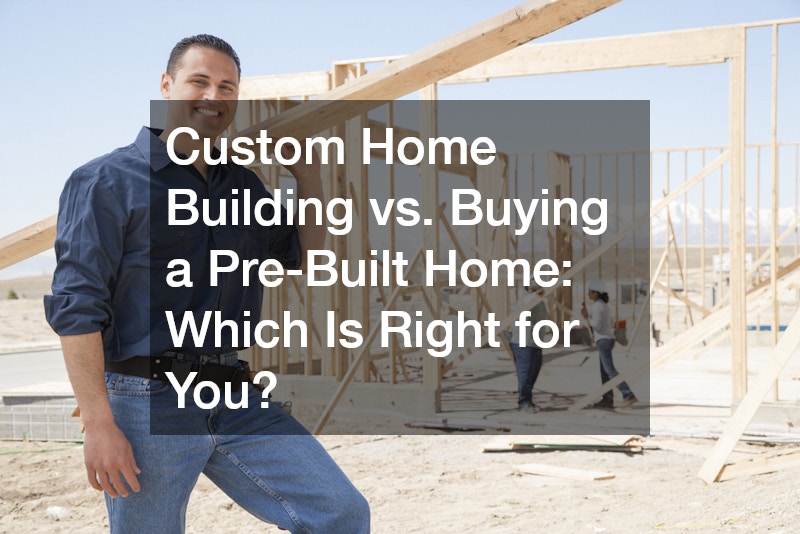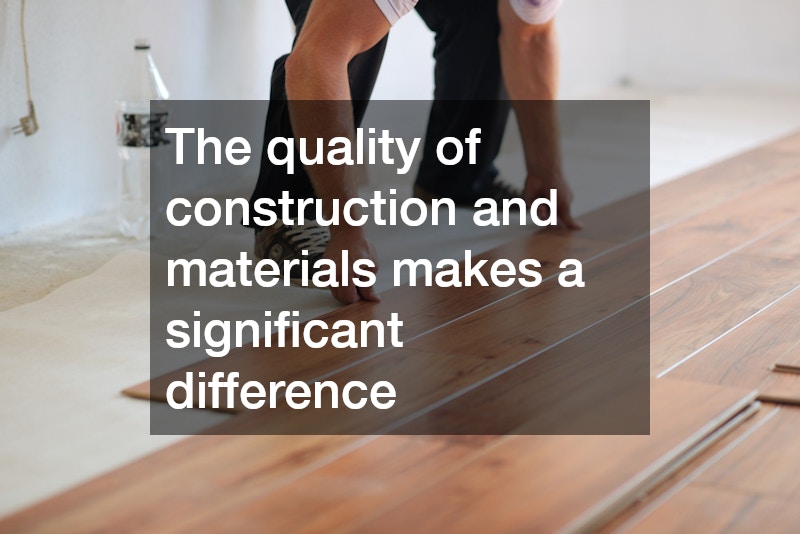
-
Custom home builders offer full control over layout, finishes, and features, allowing for a personalized and unique living space.
-
Pre-built homes are move-in ready and generally more affordable, with minimal involvement in design decisions.
-
Costs differ significantly: custom homes often require higher upfront investment and careful budgeting, while pre-built homes offer predictable pricing.
-
Timeline matters: building a custom home can take 12–18 months or more, whereas pre-built homes allow faster occupancy.
-
Quality and longevity: custom homes typically use higher-quality materials and energy-efficient systems, which can reduce long-term maintenance and increase resale value.
-
Lifestyle priorities are key: choose a custom home for long-term comfort and personalization, or a pre-built home for convenience and speed.
-
Future-proofing: custom home builders allow integration of aging-in-place features, smart technology, and sustainable design elements for long-term benefit.

Choosing between building a home from the ground up or purchasing one that’s already built is one of the most important housing decisions a person can make. It’s not just about where you’ll live—it’s about how you’ll live. Some people want the freedom to design every inch of their home to match their exact lifestyle, and that’s where working with custom home builders becomes appealing. Others value convenience, affordability, and speed, which makes buying a pre-built home the more practical option.
The choice isn’t always obvious, and it depends on multiple factors including cost, design flexibility, construction timelines, quality, and even long-term financial goals. Both paths can lead to a comfortable, functional home, but the journey and results are very different. This article explores each option in depth, weighing the pros and cons to help you decide which is right for your needs.
Understanding the Basics
At its core, the difference between building a custom home and buying a pre-built one comes down to control versus convenience. A custom home is all about tailoring the space to fit your life, while a pre-built home is about moving quickly into a property that’s already complete.
Working with custom home builders usually involves purchasing land first, then partnering with an architect, design team, and construction crew to bring your vision to life. The process requires more involvement but results in a one-of-a-kind space. Pre-built homes, on the other hand, are designed for the general market by developers and built in batches. Buyers may have a few cosmetic choices, but the structure and layout are already set.
To summarize the basics:
-
Custom homes: Designed and built specifically for you, often on land you choose.
-
Pre-built homes: Move-in-ready, designed for the average buyer, and built with cost efficiency in mind.
Comparing Costs
For most homeowners, cost is the first factor they evaluate. It’s important to recognize that while both custom and pre-built homes can range in price depending on size and location, the way the expenses are structured is very different.
When you choose to work with custom home builders, you’re paying not only for the home itself but also for the design process, permits, specialized labor, and often higher-end materials. You also have to budget for land acquisition and preparation, which can involve clearing trees, grading soil, or adding utility hookups. Pre-built homes, in contrast, package most of these costs together, making the purchase price simpler to understand.
Custom Homes: Cost Factors
-
Land purchase and preparation, which can vary greatly depending on location.
-
Architectural and design fees when creating floor plans and layouts.
-
Permits and inspections required before and during construction.
-
Builder and subcontractor labor costs.
-
Materials and finishes chosen by the homeowner, which can raise costs significantly.
-
Construction loans that cover building until a mortgage replaces them.
Pre-Built Homes: Cost Factors
-
A fixed purchase price that includes land, materials, and labor.
-
Lower entry cost thanks to bulk purchasing by developers.
-
Fewer hidden fees since the house is already complete.
-
Simpler financing through a traditional mortgage without interim construction loans.
Pros and Cons at a Glance
-
Custom homes allow you to control where your money goes, but costs can escalate quickly if you select premium materials or run into site complications.
-
Pre-built homes are easier to budget for since the price is fixed, but you sacrifice control over what materials and finishes are used.
Flexibility and Personalization
One of the biggest advantages of custom home builders is the ability to personalize nearly every element of your home. If you want a large, open kitchen that flows into a dining and living space, you can design it. If you need an in-law suite for extended family or a home office with soundproofing, those details can be included. This flexibility ensures the house grows with you and adapts to your long-term lifestyle.
Pre-built homes, by contrast, limit your choices. Developers often allow buyers to pick from a menu of cosmetic upgrades, such as flooring types, cabinet colors, or appliance packages, but the structure itself remains largely unchanged. While this simplicity appeals to buyers who don’t want to make endless design decisions, it leaves little room for truly customizing the space.
Custom Homes: Personalization Options
-
Complete freedom to design floor plans, including room sizes, placement, and flow.
-
Ability to select finishes such as flooring, cabinetry, lighting, and fixtures.
-
Opportunities to add special-purpose rooms like gyms, libraries, or workshops.
-
Options for sustainability, such as solar panels, eco-friendly materials, and advanced insulation.
-
Integration of smart home features, security systems, and modern wiring.
Pre-Built Homes: Personalization Options
-
Cosmetic upgrades like flooring, paint colors, and countertops.
-
Basic appliance upgrades with limited brand choices.
-
Post-purchase personalization through furniture, décor, or landscaping.
-
No significant ability to alter layout, structure, or core systems.
The bottom line: custom home builders give you the ability to shape your dream home exactly as you imagine it, while pre-built homes provide only surface-level choices.
Timeframe and Convenience
Time is often one of the clearest distinctions between these two options. Building a home from scratch is an involved process that requires patience, while buying a pre-built home can get you into a property almost immediately.
Custom homes typically take 12 to 18 months to complete, though complex designs or unforeseen delays can extend that timeline. Homeowners working with custom home builders need to attend design meetings, approve plans, and make frequent decisions about finishes and layouts. It’s a rewarding process, but it requires a hands-on approach.
Pre-built homes, on the other hand, are designed for convenience. Many are move-in ready, and even if they’re under construction, you may only need to wait a few weeks. For buyers relocating for work or families who need housing quickly, this speed is often the deciding factor.
Custom Homes: Timeline Factors
-
Average build time of one to one and a half years.
-
Delays from weather, permitting, supply chain issues, or subcontractor scheduling.
-
Requires regular communication and involvement with builders.
-
Rewarding for those who enjoy being part of the design process.
Pre-Built Homes: Timeline Factors
-
Move-in ready in weeks or months.
-
Minimal involvement needed from the buyer.
-
Streamlined process with fewer potential delays.
-
Ideal for buyers who prioritize speed and convenience over customization.
Quality and Long-Term Benefits
When evaluating the long-term picture, the quality of construction and materials makes a significant difference. Homes built by custom home builders are often constructed with higher-quality finishes and more attention to detail, particularly if you have the budget to prioritize durability. For example, you might choose hardwood flooring instead of laminate, energy-efficient windows instead of standard ones, or a metal roof designed to last decades. These decisions can reduce maintenance costs and increase resale value down the road.
Pre-built homes vary widely in quality depending on the developer. While some builders use reliable materials, others may cut costs by selecting cheaper options. Because developments often use the same layouts and finishes repeatedly, resale potential may also be limited compared to a unique, custom-built property.
Custom Homes: Long-Term Benefits
-
Greater control over materials and finishes, resulting in higher durability.
-
Energy-efficient options that reduce utility bills.
-
Ability to design for the future, such as aging-in-place features or smart home integration.
-
Unique properties often stand out in the resale market.
Pre-Built Homes: Long-Term Benefits
-
Lower upfront costs allow buyers to save or invest in upgrades later.
-
Predictable quality when buying from reputable developers.
-
Less planning and decision fatigue during the purchasing process.
-
Suitable as starter homes for buyers who may not plan to stay long term.
Lifestyle Fit and Personal Priorities
Ultimately, the decision between custom and pre-built often comes down to lifestyle priorities. Some people want a forever home and are willing to invest the time, money, and energy to make it perfect. Others simply need a functional, affordable home quickly and don’t want the stress of overseeing construction.
Questions to Ask Yourself
-
Do I enjoy making detailed design choices, or would that feel overwhelming?
-
How soon do I need to move into my home?
-
Is my budget flexible enough to cover potential cost overruns?
-
Am I looking for a starter home or a forever home?
-
Is location flexibility more important than design flexibility?
Best Fit by Homeowner Type
-
Young families may choose pre-built homes for affordability but often see the long-term benefits of building custom.
-
Retirees frequently opt for custom homes that include accessibility features like wide doorways and single-level layouts.
-
Busy professionals often lean toward pre-built homes for convenience.
-
Creative homeowners or design enthusiasts tend to prefer custom builds for the chance to create something unique.
Both options—working with custom home builders to create a personalized home or purchasing a pre-built property for convenience—can lead to a great living space. The right decision depends on your financial flexibility, timeline, and personal preferences. Custom homes offer unmatched personalization, higher quality, and the chance to design for the future, but they require patience and investment. Pre-built homes deliver speed, affordability, and simplicity, though at the cost of flexibility and uniqueness.
By weighing the trade-offs carefully and considering your long-term goals, you can choose the path that best fits your lifestyle.
